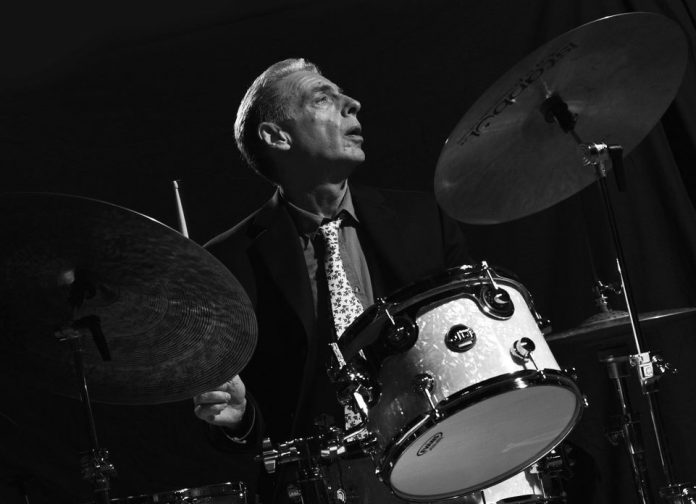Clark’s time playing for Hancock meant everybody heard him, but it was his playing on the record Thrust and in particular tracks such as Palm Grease and Actual Proof that, as Hancock described in his 2014 autobiography, “made people really sit up” – especially within the drum community where these tracks are still obsessed over today. Despite the impact Thrust would later have though, Clark remembers that his experience in the studio laying down the tracks was not exactly a smooth operation.
‘Man, there is nothing more satisfying for me than playing in a jazz band that’s swinging hard. To me that is the most exhilarating feeling that I have experienced on every level. Physical, emotional, all of it’
“I approached the tune Actual Proof like it was a jazz piece with lots of improvisation”, he explains. “I was asked not to bring that [vibe] to most of the tunes and to simplify my parts, so I did. That being the case when I went to play the track I knew this was the only piece that I would be able to blow on and bring my jazz language to. But as we started to play the producer came in and said he wanted me to play real simple like I did on the other tracks.
“I was horrified so I pretended to use the bathroom”, he laughs. “Instead, I snuck into a studio and chanted Nam Myoho Renge Kyo, (a religious Buddist chant) which Herbie had told me would change my life. I chanted for 20 minutes so I would be able to express myself musically and play the way I normally play … I really wanted people to hear what I am about. So I came back into the studio and the producer was still wanting me to square up the music so I said ‘Let us play it our way as we have a great approach to this piece.’ He angrily agreed but gave us just one take to make it happen or we were doing it his way. Now this is one complicated piece, but we did make it happen in one take and the rest is history. I am very grateful that I was on that album as Actual Proof has brought my life many beautiful benefits to this day and I felt I was able to make a substantial contribution.”
Clark eventually left what he felt was becoming ‘a two and four gig for drums’ or a ‘back-up band for a singer that wasn’t there’.
“There wasn’t much improv and I was being asked to just play time and keep a beat. I mean a few guys would solo, but there was no interaction and I was starting to get dark. Herbie also hired a rhythm guitarist who was unable to solo. I knew my days were numbered.”
Outside the Herbie-led line-up of the outfit, Clark later went on to co-lead an equally groovy second incarnation of Head Hunters, again featuring Jackson and saxophonist Bennie Maupin. The band scored success with the album Survival Of The Fittest and a disco hit with the universally spun God Made Me Funky. Clark and Jackson actually wrote that track years before it was released in 1975; it was later sampled by N.W.A., Prince and many others.
Upon his departure from Hancock’s employment, Clark also made the move to New York City where he again re-evaluated his playing and relearned what he describes as the East-Coast style. “I had to add a lot of bebop language and phrasing to my playing to fit in with the New York cats as, like the blues, [that music] underlies everything. I had to go back and try to understand this music on a much deeper level, and I am still trying to do this. I don’t think one lifetime is enough to really get this music. I had to learn different ways to approach the ride cymbal for example, and how to really make things work instantly with people I didn’t know or had never played with.”
Adding to the already extensive list of artists he has played with over the years he has also found time to record and tour with Christian McBride, Donald Harrison, Randy Brecker, Charlie Hunter, Delbert Bump, Eddie Henderson and a new group Venture featuring Mark Sherman, Chase Baird and Felix Pastorius, son of Jaco. Clark has also enjoyed wide success in his own right, leading some stellar bands and releasing nine solo records to date.
This year has also seen the release of Clark’s first drum instruction manual, The Post-Bop Drum Book, a publication that binds together insightful text, notated exercises and detailed transcriptions of some of his most celebrated bop grooves and licks. The book reads as a broad overview of the bop style he first dissected in the early 60s as a teenager and the style he can be mostly heard playing today.
“Man, there is nothing more satisfying for me than playing in a jazz band that’s swinging hard”, he says in closing. “To me that is the most exhilarating feeling that I have experienced on every level. Physical, emotional, all of it. It allows people to create an environment with possibilities for total unity and communication. The heart of many jazz musicians is the act of playing the music. That’s why we can play the same standard tunes and it remains new and different each time. I was credited with an innovation, but for me the act of playing this music with great musicians is the highest form of art that I know. I have added years of language on to my playing, from Chick Webb until now, and am constantly working on this … that and getting a deeper groove.”
The Post-Bop Drum Book by Mike Clark is now available to order here: https://hudsonmusic.com/product/the-post-bop-drum-book/


